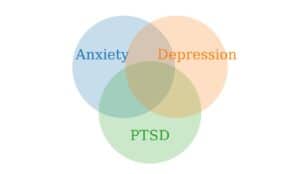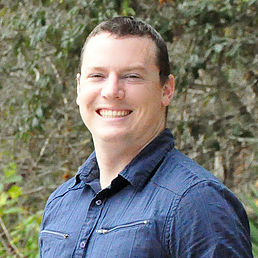What is Posttraumatic Stress Disorder (PTSD?)
Posttraumatic Stress Disorder (PTSD) is a mental health disorder that occurs in 13-15% of people throughout their life after they experience or witness a traumatic event. These events might include natural disasters, serious accidents, war or combat, sexual assaults, rape, or directly witnessing the aftermath of any of the above.
What are the Symptoms of PTSD?
The symptoms of PTSD vary greatly and the disorder can appear similar to anxiety, depression, or a combination of both. Shared symptoms can make accurate diagnosis difficult, and proper assessment is required to differentiate disorders as illustrated below.

The symptoms of PTSD have been divided into four important clusters:
- B) Intrusive thoughts, such as frequent unwanted memories; distressing dreams; or images of the traumatic event.
- C) Avoiding people, places, activities, objects, and situations that bring on distressing memories.
- D) Negative thoughts and feelings, which may include distorted beliefs about themselves, or others (e.g., “I am bad,” “No one can be trusted”); recurring feelings of fear, horror, anger, guilt or shame; less interest in activities previously enjoyed, or feeling detached or estranged from others.
- E) Arousal and reactive symptoms, which may include being increasingly irritable and having angry outbursts. These symptoms may also include reckless or self-destructive behavior, increased startle response, or having problems concentrating or sleeping.
The symptoms of PTSD must be present for more than one month for a diagnosis of PTSD to be established, and the symptoms generally must cause distress or functional, social, or occupational impairment.
PTSD Treatment Options
While there are a handful of evidence-based therapies that have been demonstrated to be effective for treating PTSD. These include Exposure Therapy, Prolonged Exposure, or Trauma Management Therapy, and Cognitive Processing Therapy. At Neurocove Behavioral Health, we currently recommend Cognitive Processing Therapy.
Cognitive Processing Therapy
CPT is typically delivered over 12 sessions and helps patients learn how to challenge and modify unhelpful thoughts and beliefs associated with their trauma. By challenging these thoughts and beliefs the patient creates a new understanding of the traumatic event. This improved understanding may improve the quality of life. At this time, CPT is strongly recommended for the treatment of PTSD.
Treatment begins with education regarding PTSD, thoughts, and emotions. As the patient becomes more aware of the relationship between thoughts and emotions, they begin to identify “automatic thoughts” that may be maintaining their symptoms. Next, the patient writes an impact statement that explains their understanding of why the traumatic event happened and how it has negatively impacted their life.
As the patient begins more formal and guided processing of their trauma, they have the option to write a detailed account of their worst traumatic experience. This account is read in the next session. This reading is conducted to encourage patients to confront difficult thoughts and emotions, thus breaking the cycle of avoiding thoughts and feelings associated with the trauma. The therapist helps the patient question his or her unhelpful thoughts about the trauma to modify problematic thinking.
When the patient has developed skills to successfully challenge unhelpful thinking, they use those skills to continue assessing and modifying beliefs related to traumatic events. The therapist helps the patient refine the ability to use these new skills outside of treatment to improve their quality of life. Therapists may then focus on specialty topics, such as safety, trust, power, control, esteem, and intimacy. These themes are frequently associated with traumatic experiences.
Helpful Resources for PTSD and CPT.
If you want to learn more about CPT, the resources below are excellent. If you are interested in starting CPT, please contact us to schedule your initial appointment.
About the Author:
Dr. Benson Munyan is a Clinical Psychologist licensed in both Florida and Arizona. He is the Director of Neurocove Behavioral Health and specializes in the assessment and treatment of anxiety, depression, and trauma-related disorders. Dr. Munyan earned his Doctorate in Clinical Psychology from the University of Central Florida. He currently holds clinical privileges at both Neurocove Behavioral Health and the Orlando Veteran’s Affairs Healthcare System. He has also previously published clinical research and articles in peer-reviewed journals including PLoS One and Clinical Case Studies.
- Which Therapy is Best? - December 14, 2023
- How to deal with Burnout when you’re sick of everything and everyone. - February 23, 2022
- The Hidden Dangers of Social Media: How It Can Eat Away at Your Mental Health - August 21, 2021








